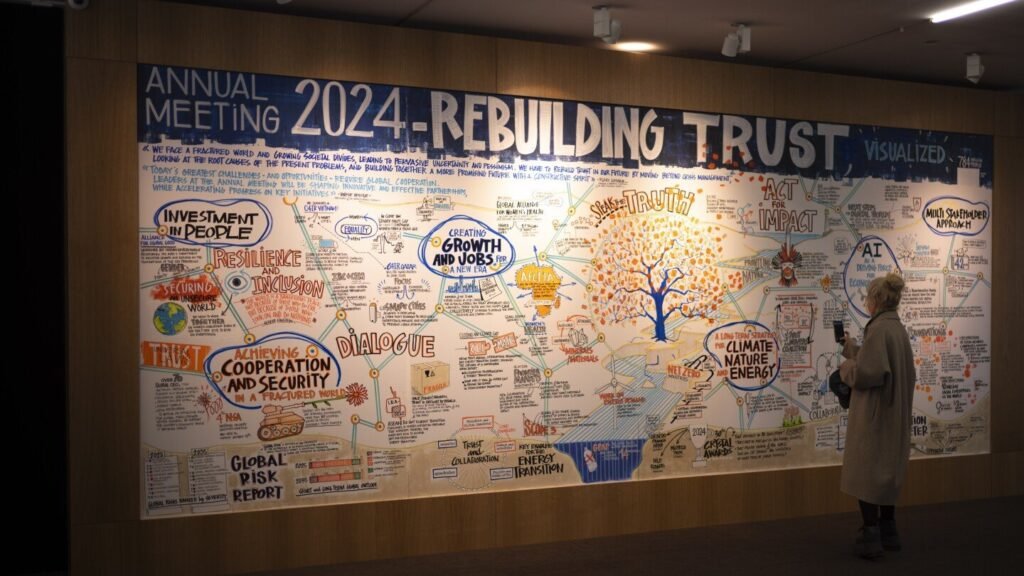DAVOS, Switzerland (news agencies) — Business and political elites descended on the Swiss Alpine snows of Davos to suss out “rebuilding trust” in a splintering world. If there’s any takeaway from the World Economic Forum’s annual meeting — boldly touting that theme — it’s that we still have a long way to go.
From full-blown wars in Ukraine and the Middle East to suspicions that corporate chiefs and tech whizzes are out to make a buck off of displacing workers with artificial intelligence, trust is clearly in short supply.
The Davos gathering wrapped up Friday after a yearly pulse-taking of leading decision-makers. The idea is getting people together, and big announcements are often just a byproduct — not the aim. That’s if they come at all.
“It’s unrealistic to think that Davos — or any meeting, anywhere in the world — in one meeting can rebuild trust when it’s fragmented on so many dimensions,” said Rich Lesser, chairman of Boston Consulting Group.
But thousands of conversations between the social, private and public sectors help create “a starting point for rebuilding trust,” he said.
A big artistic wall headlined “Rebuilding Trust” that greeted bigwigs from Bill Gates to the Iranian foreign minister was full of phrases like “Growth and Jobs,” “Climate Nature Energy” and “Cooperation and Security” — buzzwords that, to some, smack of empty talk.
Critics say the annual meeting, which started more than half a century ago, are a preserve of business chieftains who covet greater wealth and politicians who want to stay in power. The event is hard-wired to foster can-do optimism, but geopolitical gloom weighs heavy.
“What is striking, if not shocking, for me at Davos is this weird commitment on the part of the participants to adopt an optimistic mindset,” said Agnès Callamard, secretary-general of Amnesty International. “But optimism for the purpose of maintaining the status quo and keeping my privilege. That’s not optimism.”
“That’s craziness, frankly, and it’s battering our poor world,” she added.
The general conclusion, attendees said, was that the global economic picture is a bit brighter than might have been thought — interest rates and inflation seem to have peaked in the richest markets — but it’s still anybody’s guess where intractable wars and looming elections in places like the U.S., India, the European Union and South Africa will redirect the world.
Here are some takeaways from Davos and the work that still lies ahead:
Long before Russia’s war, Ukraine staked out prime real estate on the Davos Promenade main drag to promote its development and efforts to turn westward. Over the last two years, authorities in Kyiv have used the event to call for more support for their fight.
In 2022, months after Russia’s invasion, that was an easier ask. This year, Ukraine war fatigue in Europe and the U.S. have set in.
President Volodymyr Zelenskyy headlined Tuesday’s action, pleading for more support from Western allies as billions in new funding from the United States and European Union remain locked up by homegrown political squabbles.
“Please, strengthen our economy, and we will strengthen your security,” Zelenskyy urged.
Britain, for its part, played up its recent 2.5-billion pound ($3.2 billion) contribution to Kyiv and urged allies to follow suit.
Concerns about the economy that dominated last year have given way to hope — at least from business execs — that generative AI could boost productivity and cut down on rote tasks.
But naysayers fear explosive growth of the technology is going too fast for regulators, threatens to push people out of their jobs and could foment greater misinformation than is already found on social media.
Some say humans have to maintain control, not allow technology to make crucial decisions on its own.
“No matter how much AI can do, humans are still the deciding factor. So we have to focus on the training of human resources, especially the highly skilled workers,” Pham Minh Chinh, Vietnam’s prime minister, said on a Davos panel.


